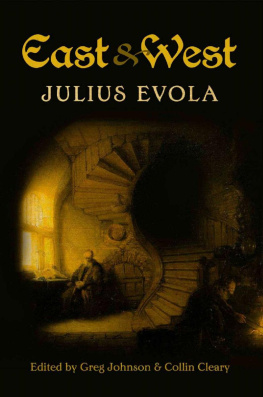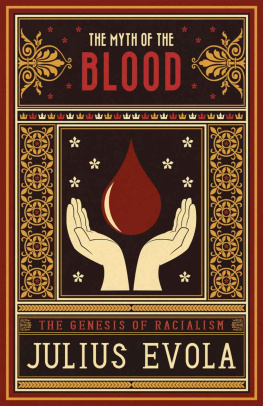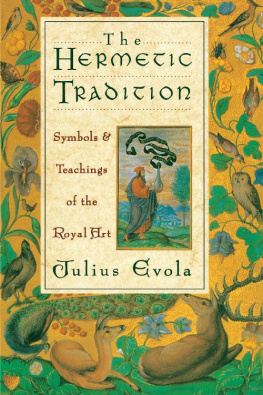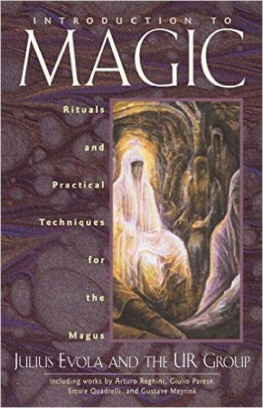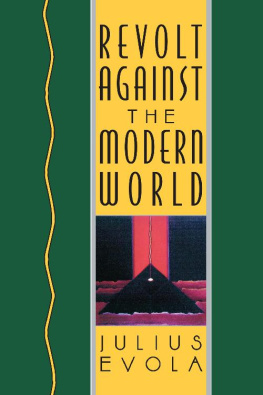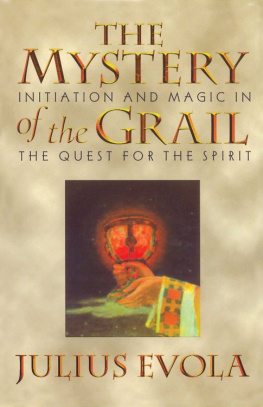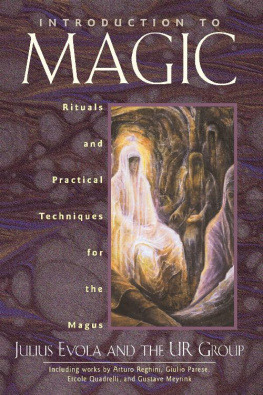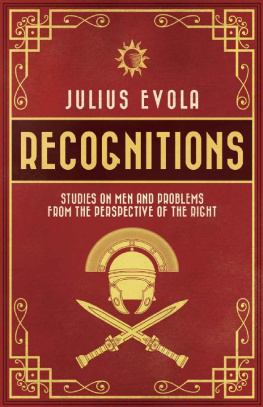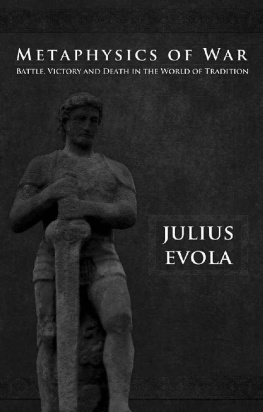E AST & W EST
C OMPARATIVE S TUDIES IN
P URSUIT OF T RADITION
by
J ULIUS E VOLA
E DITED BY G REG J OHNSON & C OLLIN C LEARY
Counter-Currents Publishing Ltd.
San Francisco
2018
Copyright 2018 by Counter-Currents Publishing
All rights reserved
Cover image:
Rembrandt, Philosopher in Meditation , 1632
Muse du Louvre
Cover design by
Kevin I. Slaughter
Published in the United States by
C OUNTER- C URRENTS P UBLISHING L TD.
P.O. Box 22638
San Francisco, CA 94122
USA
http://www.counter-currents.com/
Hardcover ISBN: 978-1-935965-66-4
Paperback ISBN: 978-1-935965-67-1
E-book ISBN: 978-1-935965-68-8
Library of Congress Cataloging-in-Publication Data
Names: Evola, Julius, 1898-1974. | Johnson, Greg, 1971- editor. | Cleary,
Collin, 1973- editor.
Title: East and west : comparative studies in pursuit of tradition / Julius
Evola ; edited by Greg Johnson and Collin Cleary.
Description: San Francisco : Counter-Currents Publishing, 2013. | Includes
bibliographical references and index.
Identifiers: LCCN 2013014905 (print) | LCCN 2013022700 (ebook) | ISBN
9781935965688 (epub) | ISBN 9781935965664 (hardcover : alk. paper) | ISBN
9781935965671 (pbk. : alk. paper)
Subjects: LCSH: Tradition (Philosophy) | Tradition (Theology) | Philosophy. |
Religions.
Classification: LCC B105.T7 (ebook) | LCC B105.T7 E96 2015 (print) | DDC
109--dc23
LC record available at https://lccn.loc.gov/2013014905
C ONTENTS
F OREWORD
East and West collects eighteen essays and reviews by Julius Evola published in the journal East and West from 1950 to 1960. East and West was edited by Giuseppe Tucci and published by the Italian-based Institute for the Study of the Middle and Far East (Istituto di Studi per il Medio e lEstremo Oriente, ISMEO). East and West published works by leading scholars of Eastern and Western thought, including Mircea Eliade, Franz Altheim, and Lionello Lanciotti.
East and West was published in English. Evola wrote his articles in Italian, and they were translated anonymously by one or more translators. Evolas Italian originals are no longer extant, which is a pity, because the quality of the translations is uneven, and some passages are obviously just wrong. However, even in the absence of the originals, it was still possible for us to render the texts in more lucid and idiomatic English.
Other difficult passages were clarified by consulting the Italian reverse translation of these pieces published as Oriente e Occidente ( Saggi vari ), ed. and trans. Gianluca Niccoletti and Marco Pucciarini (La Queste, 1984). Although the Italian translation is not an authoritative original, it is still a highly intelligent interpretation of the English texts by scholars who have a solid understanding of Evolas thought and who are fluent in his mother tongue. In the end, however, a few baffling sentences remain.
These pieces are ordered chronologically, with one exception. We switched the order of the first two chapters, because the second essay published makes an ideal first chapter, as it introduces Evolas overall analytical framework and many of the themes treated in subsequent chapters. The chapter titles are Evolas, with the exception of chapters 8, 11, and 16. Chapters 8 and 11 are book reviews and were published without titles. We gave chapter 16 a descriptive subtitle.
The main title of this book is, of course, the title of the original journal. The subtitle, Comparative Studies in Pursuit of Tradition is our own description of Evolas basic method and orientation. Evolas comparative studies in Eastern and Western philosophy, religion, and mysticism were not motivated by a desire to facilitate political and cultural dialogue between the modern East and the modern West. Nor was he interested in superficial correspondences between academic philosophies and exoteric religions. He regarded these correspondences as manifestations of a deeper unity. Unlike C. G. Jung, however, Evola did not think that this unity arose from subpersonal or chthonic forces but were, instead, remnants of a common, primordial spiritual Tradition which influenced both Eastern and Western philosophical schools and religions.
Evola followed Ren Gunon in his belief that this primordial Tradition has been severed in the West, leaving only dead and decontextualized fragments. But they believed that the Tradition remained alive in the East. Thus those who wish to recover the Traditions of the West must look to the East to recover the esoteric teachings that provide the animating principle necessary to breathe new life and meaning into the dried remnants of the Tradition in the West. Although, as Evola argues presciently in his essay on Gunon, the rapid Westernization of the East may lead to a reversal, in which Easterners will have to go West to find the sparks with which to rekindle their own traditions.
I wish to thank my co-editor Collin Cleary as well as John Morgan, Bryan Sylvain, Matthew Peters, James J. OMeara, A. Graham, Kevin Slaughter, Tim R., and Michael Polignano for their assistance with this edition.
Greg Johnson
February 17, 2018
T HE L IBERATING I NFLUENCES OF THE T RADITIONAL E AST
The relationship between East and West, particularly with regard to the influence each exercises over the other, has of late frequently been taken into consideration, but, in my opinion, the conclusions drawn have hardly ever been satisfactory. This is due to the absence of a comprehensive appreciation of the real terms of the problem. The first thing to decide is what is meant by the general terms East and West, taking into account historical as well as other factors, since civilizations are never static. They develop and may undergo changes so radical that the East of our day is not, for instance, the East of the past, while the West of today differs from the West of even recent times. This is sufficient to explain the fact that the use of stereotyped designations is likely to lead to confusing things that are actually quite different from each other.
This is a point of great importance to those who affect to perceive a fundamental difference, if not a dialectical incompatibility, between East and West. This is what happens whenever an unwarranted identification is made of Western civilization with what can be defined only as modern civilization, which is obviously more and more difficult to identify with one continent or group of peoples, inasmuch as it is rapidly spreading over the whole world, displaying much the same characteristics everywhere. In the East, too, modern civilization has been gaining ground, not only in the realms of politics and social organization. It has also acquired a hold on the Oriental mind; many Orientals have succumbed to the mirage of Europeanization and boast of having acquired a Western mentality, culture, and way of life.
These recent aspects of an East already altered through contact with the West do not come, of course, within our purview, for if wewere to consider them, all contrasts between the two civilizations would be effaced. Indeed, we are daily witnessing not only how Orientals, suitably conditioned and trained along these lines, are quite capable of displaying the same dynamic and military qualities which were until recently considered to be the exclusive property of the Western peoples, as well as the very opposite of the alleged inertia, the passive and contemplative orientation of the Asiatic races. We are also witnessing not a few Orientals falling into step with the Westerners, even in matters of technology, scientific research, and economics. This marks a stage in a general process towards standardization, the ultimate effect of which is bound eventually to divest the terms East and West of their present respective significance; they will survive only as geographical expressions.
Next page
